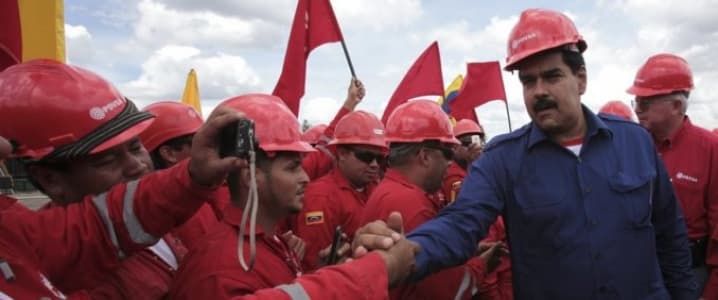Two weeks before he held a vote to set up an assembly to re-write the constitution—further undermining democracy—Venezuelan President Nicolas Maduro hosted the signing of a contract with a small U.S. company for drilling of oil wells in the country that has the world’s largest proved crude oil reserves.
Maduro welcomed Todd Swanson, the president of Purcell, Oklahoma-based Horizontal Well Drillers, to the presidential palace on July 15, and signed a non-binding memorandum of understanding (MoU) with the little-known U.S. company to explore opportunities and possibly create a joint venture additional wells in the Orinoco Oil Belt.
Last September, PDVSA said that it had awarded US$3.2 billion worth of contracts to drill in the Orinoco Belt. The contracts, PDVSA said back then, would add 250,000 bpd within 30 months from about 480 wells to be drilled. Schlumberger, Horizontal Well Drillers, and Venezuela’s Y&V Group won contracts under the tender.
This past July, two weeks before the U.S. froze all of Maduro’s assets under U.S. jurisdiction, Horizontal Well Drillers and Venezuela’s state-held oil firm PDVSA agreed to look into the opportunities within 90 days from the signing of the initial agreement, according to Venezuela’s Oil Minister Nelson Martinez. The minister took to Twitter to tout the signing of the memorandum as “international investors showing confidence in our country and in PDVSA.”
International investors, however, beg to differ, and are increasingly seeing Venezuela as a very high-risk country becoming an authoritarian regime amid rampant inflation, dwindling cash reserves, and piling bond obligations and payments due oil contractors and traders. Despite the fact that it holds the world’s biggest crude oil reserves, Venezuela is on the brink of default, and its people—who lack even the most basic necessities—have been protesting against Maduro’s authoritarian plans for months. Clashes left more than 100 people dead in four months. Related: Oil Futures Point To Higher Oil Prices
The biggest international oilfield services groups booked impairments from their Venezuelan businesses in Q2, and Big Oil is said to be pulling staff out of the country. A risky endeavor indeed, Horizontal Well Drillers signed a non-binding MoU to work with PDVSA, which can’t even pay for cleaning tankers or for the oil products that it needs to import because refineries are working at less than 50 percent capacity.
Commenting for Bloomberg on Horizontal Well Drillers’ venture into this chaos, Barclays energy analyst J. David Anderson said: “It’s just screaming of country risk…Every company that we witnessed going into Venezuela over the last 10 years has come out bloodied and dragging themselves out by the fingernails. Even the big guys have struggled in recent years. It is a perilous market, to say the least.”
While Horizontal Well Drillers is gung ho to do business in this perilous market, Repsol has recently pulled all of its foreign workers from Venezuela, Statoil has pulled out its expatriate staff. Chevron and Total SA have withdrawn some employees as well, according to Bloomberg. Related: This $65 Billion Oil Opportunity Will Never Be Tapped
Oilfield services groups took impairments on Venezuelan business in Q2, although none of them specifically named PDVSA when referring to the impairments—instead, they referred to PDVSA only as a “primary customer in Venezuela”. Halliburton recognized a pretax charge of US$262 million on a promissory note from “our primary customer in Venezuela”.
Schlumberger recorded US$510 million of pretax charges, stating that “the vast majority of this amount relates to a financing agreement that Schlumberger entered into with its primary customer in Venezuela.”
Weatherford International modified its revenue recognition from its largest customer in Venezuela, and the impact of this change on the second quarter reduced revenue and increased operating loss by US$42 million and reduced net income by US$35 million.
Even the big guys are booking charges on their Venezuelan oil business and with dealing with state firm PDVSA. Small U.S. firm Horizontal Well Drillers may be diving headfirst into dangerous waters with a lot of undercurrents.
By Tsvetana Paraskova for Oilprice.com
ADVERTISEMENT
More Top Reads From Oilprice.com:
- Is This $25 Billion Nuclear Project A Go?
- Tesla Successfully Raises Funds As Cash Bleed Continues
- China Prepares For A Natural Gas Import Boom

















